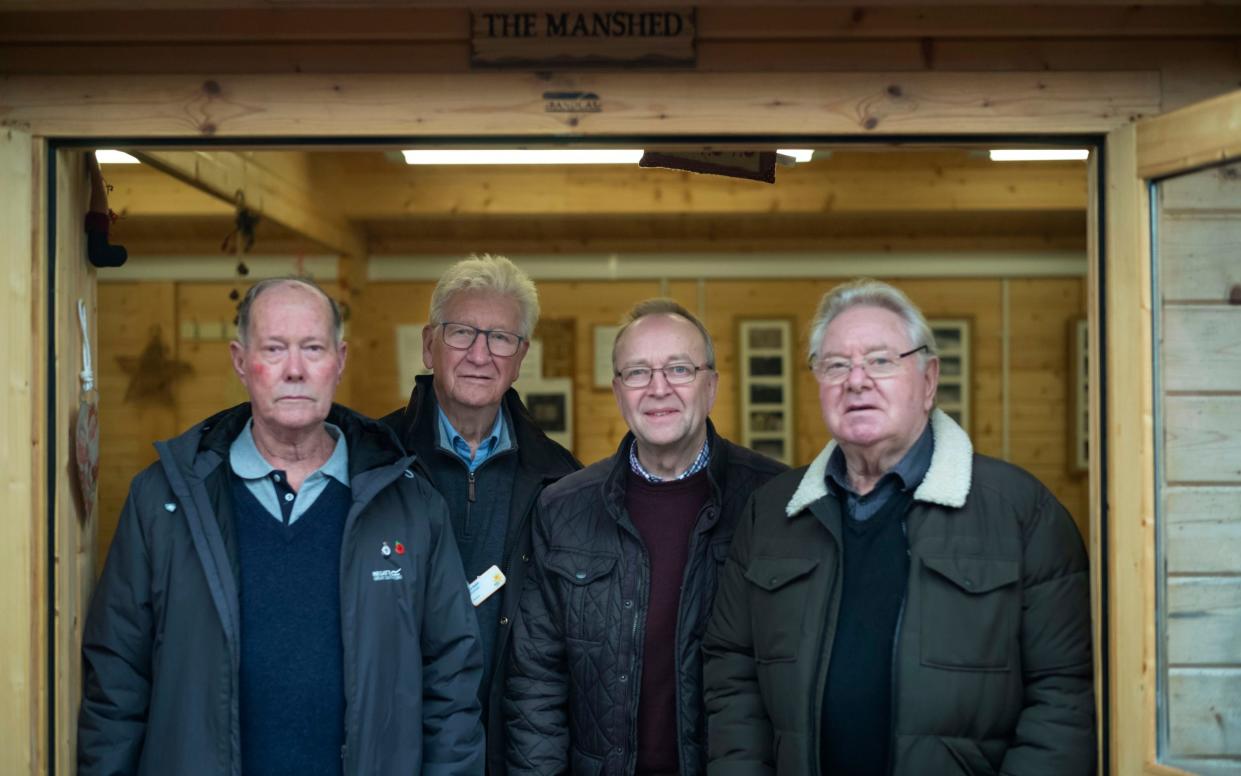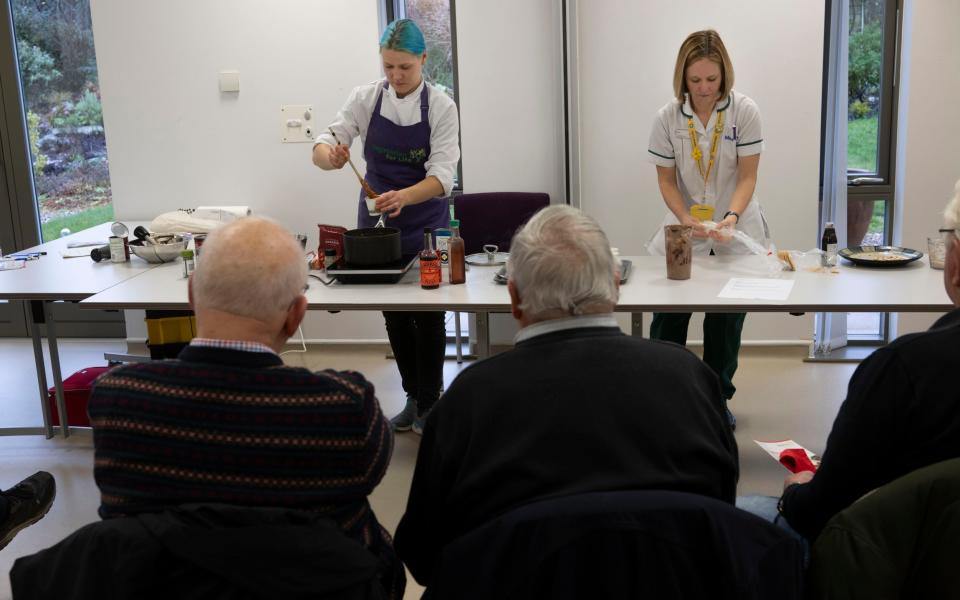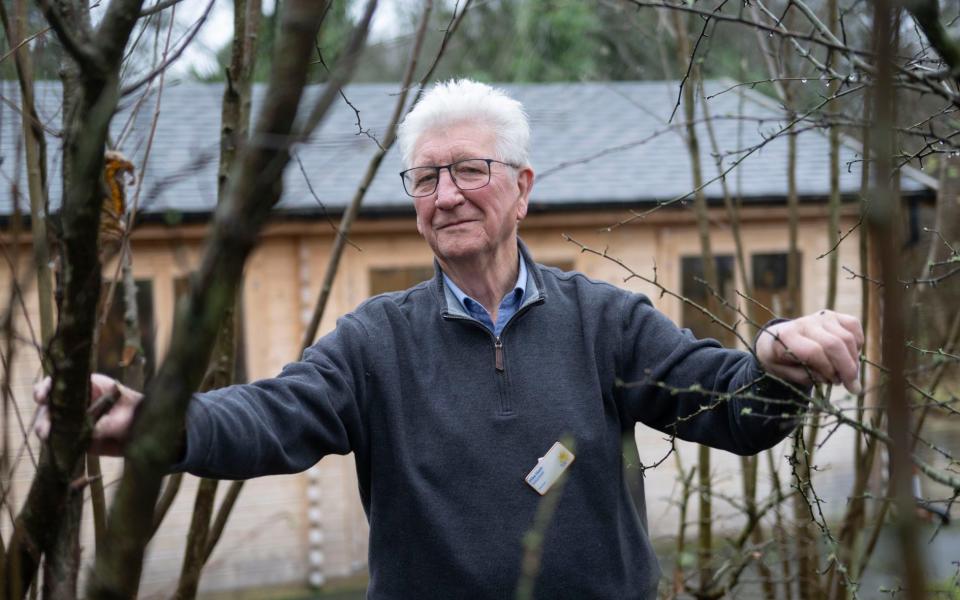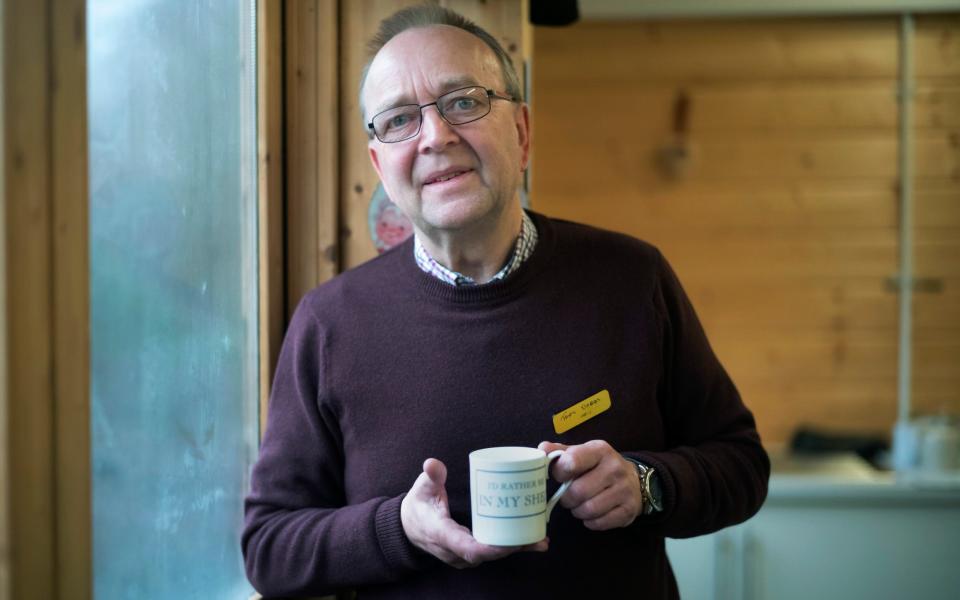‘Men who are grieving, or facing up to a terminal illness, can come here to share their experience’

When volunteers from the Marie Curie charity were looking for a place where men could support each other through serious illness and bereavement, there was really only one option. They built a large shed.
That’s no surprise. Sheds are very handy for storing garden tools and spare cans of oil, but they also serve an even more important function as places of male refuge. We escape to the shed in times of distress, or when we just need a bit of peace.
Here we can quietly lubricate our whetstones, or do important things with WD40, or indeed get on with any amount of little jobs that aren’t entirely necessary. The main thing is that, for a short time, we don’t have to face the problems of everyday life.
Wait a minute, did I say “we”? I clearly meant “they”.
As The Ladybird Book of the Shed puts it with such great authority: “The shed is the man’s natural hiding place. It is just like the pub, except nearer to home.”
The Book of the Shed is displayed proudly at the Men’s Shed, which opened in 2020 in the grounds of the shiny, modern red-brick Marie Curie Hospice in Solihull, West Midlands. Note the date. It was ready the day before lockdown, and so promptly had to close.
Now it’s going strong once more, and on a Tuesday about a dozen men gathered for tea and mince pies and a demonstration of vegetarian and vegan cookery. They chatted briefly about football – non-league Solihull Moors are doing well in the National League – and exchanged reports about their health.

One of the regulars, who is 91, popped in briefly with Christmas cards, but couldn’t stay as he’d managed to snap up a valuable appointment at the local surgery after queuing in heavy rain at 7.30am. He was sixth in line.
Ever since the invention of the stiff upper lip, it has been widely accepted that men find it difficult to talk about their feelings. Love? Death? Grief? We’d really rather talk about the Test Match, VAR, or the best route to avoid the by-pass.
But men who are grieving, or facing up to a terminal illness, can come to the Shed to share their experience, knowing that others in the group will know exactly what they’re going through.
Take Gil, 79, who is one of the newest members of the group. He’s had a tough year, and Tuesday December 19 was only his fourth visit.
His wife Cynthia died just three months ago. Two days after her funeral in late September, he had a tumour removed from his lung. He should really have had the operation earlier, but he refused – he didn’t want to leave her.
They started off as pen pals while he was serving in a tank regiment in Germany in the early 1960s. He was 18 when they started writing, and she was a year younger.
They were married for 58 years, and now she’s gone the silence sits very heavily at home. “When she was ill there were people coming and going all the time,” he says. “When she died, it went from a madhouse to nothing. Suddenly there was nobody else in the house but the cat. And the cat’s been looking for her.”
In the Shed, Gil is able tackle that most difficult of questions for men of a certain age: how do you feel?
“Groups of women will talk,” he says. “Women have always talked. They are quite open. Men don’t do that. Here, we are all in a similar situation so we do open up a bit more.”
No matter how long after a death, grief is never far from the surface. Jim, 83, still gets upset talking about his wife, Anita, who died last year from septicaemia after five weeks in intensive care.
He wasn’t allowed to visit during that time, but was called in urgently one day. He reached the hospital to discover she had died five minutes earlier.
They met at a dance in 1957. He was with a group of friends, who all noticed Anita. She barely had time to put her handbag down before Jim asked for the first dance.
They waltzed together – back then youngsters still waltzed at dances – and then he went back to his friends. He was just explaining her particular attractions in some detail when she tapped him on the shoulder and wondered whether he might fancy the next dance as well. Oddly enough, he did.
The actual building is quite upmarket as sheds go. It cost the best part of £30,000, which was raised over four years by the men themselves, with help from the local Lions charity. It’s about 12 yards by six yards – I’d bet good money that most of Tuesday’s group still think in yards – and has a television, books, games, and enough in the way of catering facilities to keep the chaps supplied with tea, coffee and biscuits.
Mike Nash’s second wife, Janet, died from bile duct cancer at the hospice, which is a short walk away. “After she died, I sort of never left the hospice,” he says. “I found it a place of peace.” The former window cleaner, 79, volunteered around the place, and was a founder member of the men’s group.

It was Mike who arranged open-air meetings in parks and a golf club during lockdown. He is also living evidence that men can be perfectly frank about their feelings once they get a bit of practice in.
Widowed twice, he is not ashamed to admit that he didn’t cope well when his first wife, Mary, died in the early 1990s. “I was drinking, and friends deserted me,” he says. “I was in a right state. I went on a binge and was p––d for a week.”
Luckily, he’d already bumped into Janet on the school run, not long after Mary’s death. “She told me: stop the bingeing, or I’m off. So I cut out the boozing and felt better.
“When Janet died, I was in a better position to understand loss. I put my energies into the club here.”
All the men say loneliness has been the biggest difficulty they’ve faced, and it’s especially bad at this time of year. When you’ve been used to organising Christmas as a couple and a family, it’s hard to find yourself suddenly alone.
“The word that sums it up for me is companionship,” says Tony Dodds, 68, a retired quantity surveyor whose wife Maureen died in April. “I felt very vulnerable, and on my own to a certain degree. The evenings were a particular struggle.”

The Shed is very much a male place. A woman recently applied to join the group, but was politely turned down. “We’ve struggled to keep this men only,” says Mike. “There are not many facilities around for men. If you let women in, all the men will act differently. They’ll put on the macho – they won’t talk about their problems.
“Men don’t want to be seen with tears, but we have tears and we have sob stories. The environment here helps them to settle down. We are purely here to help men grieve.”
The only woman who visits regularly is Lisa Shyamalan, the hospice’s lead occupational therapist. She is the official link between the Shed and the hospice.
The idea of sheds as a healthcare tool was first considered in Australia in the 1990s, and has recently been studied by academics at both Warwick and Glasgow Caledonian Universities.
The Glasgow study was snappily entitled: “Men’s sheds as an alternative healthcare route? A qualitative study of the impact of men’s sheds on user’s health improvement behaviours.”
It concluded that sheds had three benefits. They could teach men handy new skills, they gave the opportunity to make new friends, and – as has been the case in Solihull – they provide a “male-friendly” environment where experiences can be shared.
Mike Weale, 84, is another founder member, who joined after taking bereavement counselling at the hospice. “I just found I couldn’t cope with things,” says the retired electronic engineer. “It’s been a godsend to me, as my children all live miles away.”
He is now working on the group’s next project. They have enough funds left over to be able to build a vital extension to the current set-up – a modest toilet block.
With all the members of the group in their late 60s and over, how did they manage to hold out for so long?
Marie Curie is one of four charities supported by this year’s Telegraph Christmas Charity Appeal. The others are Go Beyond, Race Against Dementia and the RAF Benevolent Fund. To make a donation, please visit telegraph.co.uk/2023appeal or call 0151 284 1927

